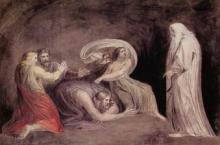Jewish culture has a complicated history with its sense of nationhood. Like any people, we strive to have a sovereign country of our own, yet so much of Jewish identity comes from the experience of being the outsider. All but one of our biblical founders, Isaac, spent a great deal of time as guests in a foreign nation and the epic story of our culture takes place entirely in transit. Even outside of the texts of the Torah, Jews have built our heritage from the perspective of the international, perpetual wanderer. Yiddish is every bit as Jewish as Hebrew and it is a hodgepodge of different languages from across Europe. Modern synagogues owe as much of their structure to the designs of our Christian neighbors in America as to our constantly evolving drive to reform. In Jewish culture, to be an outsider is to be at home. Perhaps that is why David, a king among kings, experiences one of the most important moments of his life in a foreign country.
After his final confrontation with Saul, David flees Israel with his contingent of six hundred men and enters Gath, the country of the Philistines. While there he befriends Achish, the son of the Philistine king Maoch. This is a clear parallel to David's earlier friendship with Jonathan. In a very short time, David gains the trust of the royal family of Gath and is granted control of a provincial city called Ziklag. This may seem strange considering how ferociously David fought the Philistines in the past.
There is a subtle difference between the Philistines and other enemies of Israel such as the Amalekites. The Philistines are not enemies of God or historical symbols of evil. There's a sense of honor among the Philistines of Gath, that they only do what nations were wont to do in those times. More than once, God used the Philistines as a force of nature against sinful Israelites like Saul. That David finds a temporary home among them is not so unusual. After all, David and Maoch seem to live by similar principles.
This alliance between David and Maoch is all a part of Saul's downfall, the de facto revolution of David's popular support. It's not enough for Saul to be defeated. He must be publicly ruined and his whole line erased. In chapter 28 of First Samuel it is clear just why Saul has permanently lost God's favor. Over and over again, Saul is capricious with the law. He grants clemency to people only because they are close to him, goes back on his agreements and ignores moral propriety whenever it suits him.
Case in point, when Saul consults a woman who speaks to ghosts because he wants to ask Samuel for divine favor in the eleventh hour of his war with Gath. After making a decree that such occult rituals are completely illegal (in keeping with similar laws in the Torah), Saul seeks out a practitioner of these very same arts for his own benefit. Not only that, but when the ghost of Samuel doesn't give Saul the answer he wants, Saul resides with this occultist and takes full advantage of her hospitality. This is nothing less than a major political scandal. It's the same as finding a modern politician living with drug dealers. At the end of his life, Saul is so corrupt that it seems perfectly reasonable for David to take up arms with Philistines and attack Israel.
The implications of chapters 27 and 28 of First Samuel are stirring. In this story of why exactly kings are generally undesirable, there is the suggestion that good leaders simply can't spend too much time in stasis. Saul began as a righteous, capable protector, but in those early days he was a wanderer and a runt. Given the seat of power his aptitude diminished into its final, hopelessly corrupt state. David's story is so very similar. At this point he's still righteous, but that changes the moment he assumes the throne of Israel and stops traveling.
